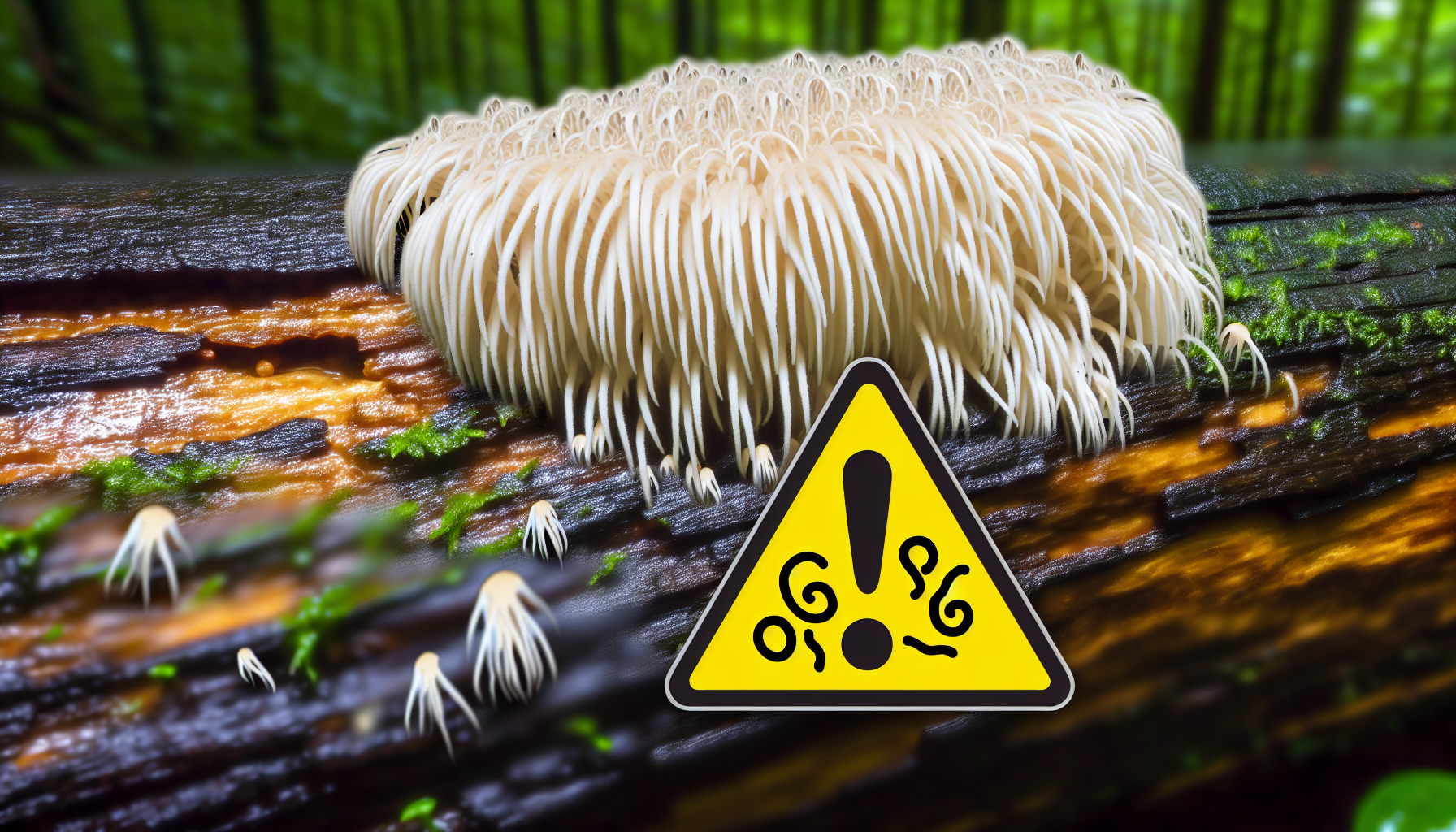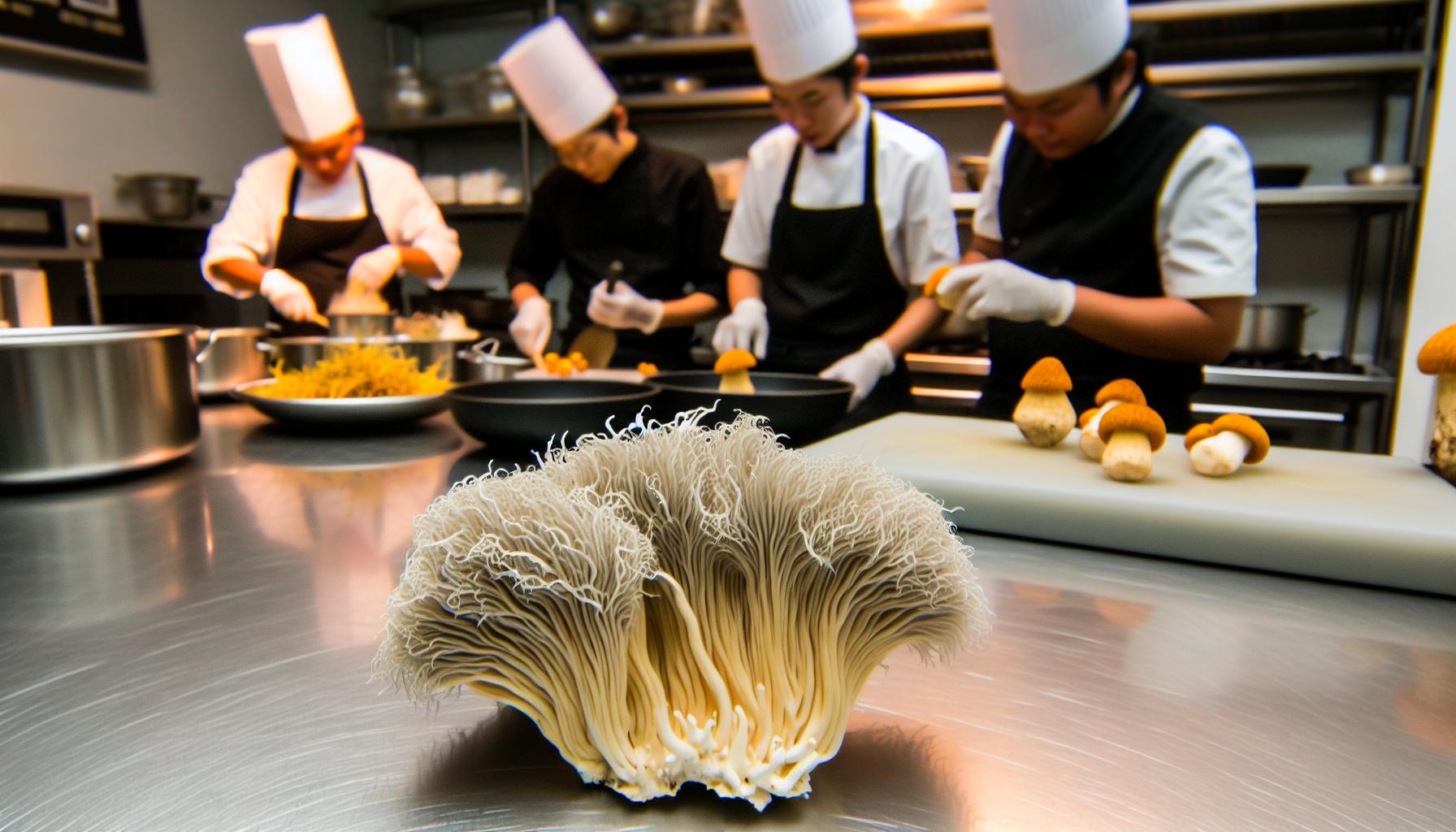Dive into a journey of discovery
Have you ever wondered about the potential health benefits of the Lion’s Mane mushroom, a fascinating medicinal mushroom renowned for its culinary and medicinal uses?
This intriguing fungus, scientifically known as Hericium erinaceus, is not only a delicious ingredient in many dishes but also has a wealth of potential health benefits.
Let's explore the unique properties of Lion’s Mane, its impact on blood pressure, and the question, “can lions mane cause high blood pressure?” Learn how you can incorporate it into your diet.
Lion's Mane Mushroom Overview

Lion’s Mane mushroom, heralded for its potential health benefits, is a fascinating medicinal mushroom that has been used in Asia and Europe for centuries. Its potential benefits extend from enhancing cognitive function, fighting inflammation, to even diminishing symptoms of depression.
The scientific community continues to recognize the benefits of Lion’s Mane mushroom as research progresses.
Traditional Uses of Lion's Mane
Lion’s Mane mushroom, also known as the lion’s mane medicinal mushroom, has been highly valued, especially in the context of traditional Asian medicine, specifically Traditional Chinese Medicine. Historical usage of this medicinal mushroom was centered on strengthening the spleen and supporting gut health.
Recent research has also begun to explore its potential neurological benefits, with a particular focus on lion’s mane mushroom extract. In fact, lion’s mane mushrooms have been gaining popularity for their potential health benefits.
Beyond supporting gut health, Lion’s Mane has been used to combat various gastrointestinal issues, including gastric ulcers and inflammation. The mushroom’s potential to promote nerve and brain cell growth has also been a focus, leading to its use in improving cognitive function and brain health.
Nutrient and Chemical Composition
Lion’s Mane mushroom’s rich nutrient profile and unique bioactive compounds contribute to its impressive health benefits. These include polysaccharides, hericenones, erinacines, and other chemical compounds like terpenoids, phenolics, steroids, pyranones, fatty acids, and alkaloids.
Alongside these bioactive compounds, Lion’s Mane mushrooms are packed with essential vitamins and minerals such as B vitamins, vitamin D, vitamin C, selenium, iron, potassium, calcium, phosphorous, copper, and zinc.
These make Lion’s Mane a valuable addition to a balanced diet, without the concern of lion’s mane addictive properties. When considering incorporating it into your routine, it’s important to research the appropriate lion’s mane dosage.
Lion's Mane and Blood Pressure

Researchers have shown interest in the potential impact of Lion’s Mane on blood pressure. Preliminary studies suggest that Lion’s Mane may possess the ability to lower blood pressure levels in individuals with high blood pressure.
This is believed to be achieved by enhancing blood vessel function. Notably, most of the research conducted thus far has involved animal studies. Thus, if you’re taking blood pressure medications, it’s advisable to consult your healthcare provider before incorporating Lion’s Mane into your routine.
Like any health intervention, monitoring is of utmost importance. If you’re considering Lion’s Mane for blood pressure management, it’s crucial to keep track of your blood pressure readings and share them with your healthcare provider. This facilitates the necessary modifications to your treatment plan, taking into account individual needs and responses.
The current research on Lion’s Mane’s effect on blood pressure is limited, with most studies involving animals. More human trials are needed to confirm the results, and the ideal dosage and duration are still unknown.
However, Lion’s Mane may contribute to long-term heart health by reducing strain on the heart and potentially addressing inflammation associated with high blood pressure.
Potential Blood Pressure-Lowering Effects
Indeed, research suggests a potential for Lion’s Mane to lower blood pressure. According to studies, extracts from the Hericium erinaceus mushroom have been found to have potential in reducing high blood pressure levels in animals.
This suggests a possible application of the mushroom in managing hypertension. Moreover, research has shown that taking Lion’s Mane can improve sleep disorders in humans, potentially leading to better blood pressure regulation by reducing high blood pressure.
The potential mechanisms through which Lion’s Mane may lower blood pressure include antioxidative effects, regulation of blood sugar levels, and potential cardiovascular benefits. Some studies also suggest that Lion’s Mane may have an impact on blood clotting, which could be particularly relevant for individuals with high blood pressure.
Although there have been studies indicating that Lion’s Mane extract may have blood pressure-lowering effects in humans, further comprehensive research is needed to fully comprehend these effects.
Factors Influencing Blood Pressure Regulation
Several factors influence blood pressure regulation, with genetics playing a significant role. Various genetic loci contribute to increased blood pressure or hypertension, and rare genetic forms of hypertension can result from mutations in specific genes related to fluid and salt balance.
Furthermore, research has revealed that no single genetic or organ pathway exerts complete control over blood pressure regulation, suggesting a complex interaction of genetic factors.
Some key factors that influence blood pressure regulation include:
- Genetics: Various genetic loci contribute to increased blood pressure or hypertension.
- Mutations: Rare genetic forms of hypertension can result from mutations in specific genes related to fluid and salt balance.
- Complex interaction: No single genetic or organ pathway exerts complete control over blood pressure regulation.
Age also influences blood pressure regulation, with a general trend for blood pressure to rise as individuals get older. Other key factors that affect blood pressure regulation encompass:
- Increased cardiac output
- Peripheral vascular resistance
- Volume of blood
- Viscosity of blood
- Various hormones and ion levels
Amidst these factors, Lion’s Mane may offer additional support. Research has indicated that Lion’s Mane extract may have the potential to lower blood pressure levels by reducing inflammatory markers. Edible mushrooms, such as Lion’s Mane, have been the subject of review for their potential health benefits in enhancing cardiovascular function and alleviating hypertension.
Precautions and Interactions

Despite the intriguing potential health benefits of Lion’s Mane, awareness of its usage precautions and potential interactions is critical. For instance, Lion’s Mane has the potential to interact with blood-thinning and anti-diabetes medications.
Moreover, individuals who have allergies or sensitivities to mushrooms should refrain from using Lion’s Mane supplements. Some individuals may encounter side effects like gastrointestinal discomfort, nausea, or skin rash, which could indicate a potential allergy or sensitivity.
Therefore, it’s crucial to consult a healthcare provider before incorporating Lion’s Mane into your regimen.
Lion's Mane and Medications
For those on certain medications, be aware that Lion’s Mane can potentially interact with these substances. For instance, Lion’s Mane may interact with blood-thinning medications and could potentially slow down the body’s ability to form blood clots.
This could lead to a higher risk of slower wound healing and increased bruising. Therefore, individuals on antiplatelet and blood-thinning medications should exercise caution when considering the use of Lion’s Mane.
Furthermore, Lion’s Mane has the potential to interact with antidiabetic medications by lowering blood sugar levels, requiring careful monitoring of blood glucose for individuals using these drugs. Therefore, it’s crucial to consult a healthcare provider before incorporating Lion’s Mane into your routine, especially if you’re taking any of these medications.
Allergies and Side Effects
For some, consuming lion’s mane mushrooms can result in adverse effects like gastrointestinal discomfort, nausea, or a skin rash. These symptoms could indicate a potential allergy or sensitivity to Lion’s Mane.
Symptoms of an allergy to Lion’s Mane mushroom can be quite severe and may include:
- throat swelling
- breathing trouble
- skin rashes
- runny nose
- watery eyes
- swelling of lips or mouth
If you experience an allergic reaction to Lion’s Mane mushrooms, it’s crucial to seek immediate medical assistance.
Signs of a serious allergic reaction can include difficulty breathing, itching, hives, swelling, and extensive rashes.
Incorporating Lion's Mane into Your Diet

There are several ways for those interested in adding Lion’s Mane to their diet. Lion’s Mane can be consumed in the form of supplements or incorporated into various recipes such as soups, stews, or coffee.
Regardless of the form you choose, taking lion’s mane and incorporating it into your diet can potentially enhance your overall health and wellbeing, providing the benefits of lion’s mane.
Choosing Quality Lion's Mane Products
Quality is crucial when selecting Lion’s Mane products. Look for products with organic certification, a guarantee that the product has been cultivated using organic farming methods without synthetic pesticides, fertilizers, or genetically modified organisms. This ensures you’re consuming a product free from harmful chemicals and produced in an environmentally sustainable manner.
In addition to organic certification, opt for non-GMO Lion’s Mane products, which guarantees that the mushrooms have not undergone genetic modification. Avoid products with additives or fillers like:
- maltodextrin
- magnesium stearate
- silicon dioxide
- cellulose
- other binding agents
These additives can diminish the purity and quality of the product.
Lastly, ensure that Lion’s Mane products originate from a reputable source by researching the brand, reading consumer reviews, and verifying the company’s transparency about their production methods and quality testing.
Cooking with Lion's Mane
Lion’s Mane can be a delightful addition to your culinary adventures. Its taste can vary depending on the cooking methods used. For instance, cooking it can result in a tender and meaty texture, while frying may bring out a bitter taste. Fresher mushrooms tend to have a firmer texture that can withstand various cooking styles.
Proper preparation of Lion’s Mane is necessary before starting to cook. Brush off any dirt with a pastry brush, trim the woody base, and if necessary, quickly rinse it under water without soaking to prevent sogginess. Once prepared, Lion’s Mane can be cooked according to your recipe.
To maintain its health benefits during cooking, slice the mushrooms and remove dirt without rinsing to prevent water absorption. Effective cooking methods include dehydrating or drying them whole.
Summary
In summary, Lion’s Mane mushroom is a fascinating medicinal mushroom with a wealth of potential health benefits, including its effects on blood pressure.
Whether you’re interested in its potential cognitive enhancements, anti-inflammatory properties, or its impact on blood pressure, Lion’s Mane offers a plethora of benefits worth exploring.
However, it’s important to remember to consult with a healthcare provider before incorporating Lion’s Mane into your routine, especially if you’re on certain medications or have mushroom allergies. With the right guidance and precautions, Lion’s Mane can be a valuable addition to your health regime.

Frequently Asked Questions
Q: Does lion's mane cause high blood pressure?
A: Lion's mane can help regulate blood sugar and reduce high blood pressure, which may indicate that it does not cause high blood pressure.
Q: What are the negative effects of lion's mane?
A: Lion's mane is generally well tolerated, but some may experience side effects like abdominal discomfort, nausea, skin rash and even interact with some medications. For those with a medical condition or history of asthma or allergies, consulting a doctor before using lion's mane is recommended to avoid the negative side effects.
Q: Is Lion's Mane bad for your heart?
A: Research suggests that lion's mane may reduce your risk of heart disease and lower oxidation of cholesterol in the bloodstream, making it beneficial for heart health.
Q: What are the potential health benefits of Lion's Mane mushroom?
A: Lion's Mane mushroom has been shown to enhance cognitive function, reduce inflammation and improve mental health, making it a great option for those looking for natural health benefits.
Q: How can I incorporate Lion's Mane into my diet?
A: Try adding Lion's Mane to your diet by taking supplements or experimenting with recipes like soups, stews, teas and coffee.







